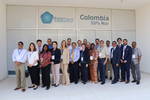Suriname
In Suriname, the principle aims of the fisheries policy are the conservation of the biological resources of the sea and their balanced exploitation on a lasting basis and in appropriate economic and social conditions. Specific aims of the policy include the reduction of unwanted bycatch and of protected species, and increased stakeholder participation. The REBYC-II LAC project is working on different aspects of the country’s fisheries, in support of these policy goals.
Suriname is the only REBYC-II LAC project country to have a Marine Stewardship Council (MSC) certified trawl fishery, the Atlantic seabob shrimp fishery. While both Turtle Excluder Devices (TEDs) and Bycatch Reduction Devices (BRDs) are well implemented in this fishery, experiments are done to optimize these devices, and improve their use also in the Penaeus shrimp trawl fleet. To reduce unsustainable bycatch in the demersal finfish trawl fleet, innovative solutions such as flexible cable TEDs are being tested and evaluated. Further, to reduce trawler discards and food loss, the possibilities for bycatch utilization are being investigated.
The largest fishing sector in Suriname is the artisanal fleet, mainly deploying gillnets in the coastal waters. Often targeting the same species, artisanal and industrial fisheries are ecologically connected and require a holistic co-management approach. To ensure effective stakeholder participation in fisheries management, the REBYC-II LAC project supports the formation of fisherfolk organization, and runs capacity building and mentoring programs to strengthen the organizations.
Other goals of the REBYC-II LAC project in Suriname include strengthening collaboration with the Coast Guard to ensure effective fisheries inspections at sea, ensuring correct stakeholder participation in the drafting of a new national fisheries legislation and update of the fisheries management plan, and improving the national fisheries data collection system.
REBYC-II LAC Pilot Sites: The industrial and artisanal fisheries based in Paramaribo and fishing communities in Commewijne, Galibi (Marowijne), Boskamp (Saramacca), Coronie and Nickerie.
Recent news from Suriname











